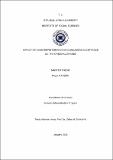Please use this identifier to cite or link to this item:
http://hdl.handle.net/11547/5271Full metadata record
| DC Field | Value | Language |
|---|---|---|
| dc.contributor.author | Mardini, Roula | - |
| dc.date.accessioned | 2020-01-08T07:10:56Z | - |
| dc.date.available | 2020-01-08T07:10:56Z | - |
| dc.date.issued | 2019-01 | - |
| dc.identifier.uri | http://hdl.handle.net/11547/5271 | - |
| dc.description.abstract | Sahte markaların, tüketicilerin orijinal markaları kabul etmeleri üzerindeki etkisini incelemek için mevcut araştırmalar yapılmıştır. Sahte marka, büyük şirketlerin iş hayatlarında uğraştığı bir konudur. Üreticiler arasında rekabetin artmasına yol açan teknoloji ve iş dünyasının gelişmesiyle bazı üreticiler, kendi markalarını müşterileri için tanınabilir hale getirmek için belirli bir isim ve renkte yapmaya başladılar. Bununla birlikte, bazı küçük üreticilerin bazı şirketlerin orijinal markalarını kopyalayıp üretmeye başladığında, sahte markalar konusu tartışıldı. Ürünler başka bir fabrikada, orijinal ürünle aynı veya daha az kaliteye sahip orijinal adında üretilir ve normalde daha düşük fiyata satılır. Bu ucuz fiyat, muhtemelen orijinal markayı satın alamayan pek çok müşteriyi çekiyor. Hükümetler, orijinal şirketler için özel ürün ve ad üretme hakkını korumaya karar vermiş olsalar da, sahte markalar günlük olarak yüksek miktarda satılmaktadır. Sahte markaların üretildiği ve satıldığı yerlerden biri de Türkiye'de. Bu nedenle, sayaç markalarının orijinal markaların tüketicilerini nasıl etkilediğini bulmak için mevcut araştırma yapılmıştır. Araştırma, sahte markaların geliştiği bir işin olduğu Türkiye'de yapıldı. Araştırmanın yapılacağı nüfus Türkiye'deki tüketiciler, hedef nüfus ise İstanbul'daki tüketiciler. Mevcut araştırma, tüketicilere sahte marka algıları hakkında fikirlerini sormak için araştırma aracı olarak yakın uçlu anketlerle nicel araştırma yönteminde gerçekleştirilmektedir. Araştırmaya katılanların belirlenmesinde çok aşamalı kümeleme örnekleme yöntemi kullanılmıştır. Bu nedenle, İstanbul’daki 12 alışveriş merkezindeki katılımcılara 200 anket dağıtılmıştır. Bulgular SPSS ile analiz edildi. | tr_TR |
| dc.language.iso | en | tr_TR |
| dc.publisher | ISTANBUL AYDIN UNIVERSITY INSTITUTE OF SOCIAL SCIENCES | tr_TR |
| dc.subject | Sahte markalar | tr_TR |
| dc.subject | Müşteriler | tr_TR |
| dc.subject | Karar verme | tr_TR |
| dc.subject | Orijinal markalar | tr_TR |
| dc.subject | Türkiye | tr_TR |
| dc.subject | Counterfeit brands | tr_TR |
| dc.subject | Customers | tr_TR |
| dc.subject | Decision-making | tr_TR |
| dc.subject | Original brands | tr_TR |
| dc.subject | Turkey | tr_TR |
| dc.title | IMPACT OF COUNTERFEIT BRANDS ON CONSUMERS ACCEPTANCE ON THE ORIGINAL BRANDS | tr_TR |
| dc.type | Thesis | tr_TR |
| dc.description.abstractol | The current research has been conducted to examine the impact of counterfeit brands on the consumers’ acceptance of the original brands. Counterfeit brand is an issue that big companies deal with in their business life. By the development of technology and business which lead to higher competition among producers, some producer started making their own brand in a specific name, shape, to color to be recognizable for their customers. However, the issue of counterfeit brands came to discussion when some small producer started to copy and produce the original brands of some companies. Goods are produced in another factory in the name of original brand having same or less quality than original and sold in lower price normally. This cheaper price attracts a lot of customers who are probably not able to buy the original brand. Although governments agreed to save the right of producing specific goods and name for the original companies, counterfeit brands are sold in a high amount on the daily basis. One of the places where the counterfeit brands are produced and sold is in Turkey. Therefore, the current research has been conducted to find how counter brands effect consumers of the original brands. The research is done in Turkey where the counterfeit brands have a flourish business. The population for the research is the consumers in Turkey and the target population is consumers in Istanbul. The current research is carried out in quantitative research method with close-ended questionnaires as research tool to ask consumers’ opinion about their perception of counterfeit brands. Multistage clustering sampling method is used for determining respondents for the research. Therefore, 200 questionnaires are distributed among the respondents in 12 shopping center in Istanbul. The findings are analyzed by SPSS. | tr_TR |
| dc.publisher.firstpagenumber | 1 | tr_TR |
| dc.publisher.lastpagenumber | 79 | tr_TR |
| dc.identifier.bibliographictag | Mardini, Roula, IMPACT OF COUNTERFEIT BRANDS ON CONSUMERS ACCEPTANCE ON THE ORIGINAL BRANDS(2019), ISTANBUL AYDIN UNIVERSITY INSTITUTE OF SOCIAL SCIENCES | tr_TR |
| Appears in Collections: | Tezler -- Thesis | |
Files in This Item:
| File | Description | Size | Format | |
|---|---|---|---|---|
| 10239948.pdf | 1.09 MB | Adobe PDF |  View/Open |
Items in DSpace are protected by copyright, with all rights reserved, unless otherwise indicated.
